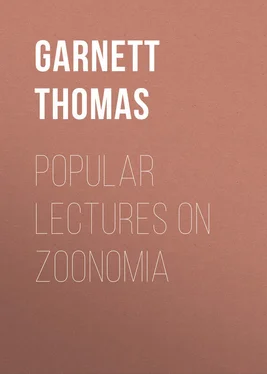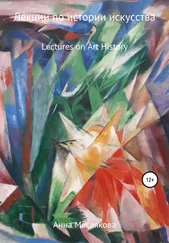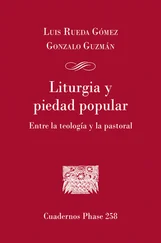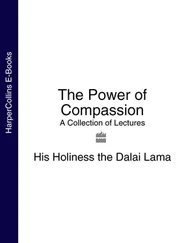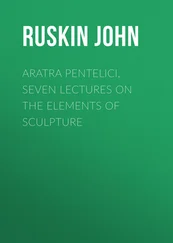Thomas Garnett - Popular Lectures on Zoonomia
Здесь есть возможность читать онлайн «Thomas Garnett - Popular Lectures on Zoonomia» — ознакомительный отрывок электронной книги совершенно бесплатно, а после прочтения отрывка купить полную версию. В некоторых случаях можно слушать аудио, скачать через торрент в формате fb2 и присутствует краткое содержание. Жанр: Биология, foreign_antique, foreign_prose, на английском языке. Описание произведения, (предисловие) а так же отзывы посетителей доступны на портале библиотеки ЛибКат.
- Название:Popular Lectures on Zoonomia
- Автор:
- Жанр:
- Год:неизвестен
- ISBN:нет данных
- Рейтинг книги:4 / 5. Голосов: 1
-
Избранное:Добавить в избранное
- Отзывы:
-
Ваша оценка:
- 80
- 1
- 2
- 3
- 4
- 5
Popular Lectures on Zoonomia: краткое содержание, описание и аннотация
Предлагаем к чтению аннотацию, описание, краткое содержание или предисловие (зависит от того, что написал сам автор книги «Popular Lectures on Zoonomia»). Если вы не нашли необходимую информацию о книге — напишите в комментариях, мы постараемся отыскать её.
Popular Lectures on Zoonomia — читать онлайн ознакомительный отрывок
Ниже представлен текст книги, разбитый по страницам. Система сохранения места последней прочитанной страницы, позволяет с удобством читать онлайн бесплатно книгу «Popular Lectures on Zoonomia», без необходимости каждый раз заново искать на чём Вы остановились. Поставьте закладку, и сможете в любой момент перейти на страницу, на которой закончили чтение.
Интервал:
Закладка:
Whilst he was in this manner exerting himself for the general diffusion of knowledge, his fame spread with the delight and instruction he had every where communicated to his audience. The inhabitants of Birmingham wished to have the advantage of his lectures; and he also received a most pressing invitation from Dublin, where a very large subscription had already been formed. It was his intention to have accepted of the latter invitation, but previous to his departure for Ireland (from whence he had even yet some thoughts of emigrating to America) he was informed of the vacancy of the professorship in Anderson's Institution, at Glasgow, by his friend the late Dr. Easton of Manchester, who strongly urged him to become a candidate. As this situation must inevitably destroy all his future prospects, he for a long time hesitated; but Dr. Easton having informed the Managers of the Institution, that there was a possibility of their obtaining a professor, so eminently qualified as Dr. Garnett, they, after making further inquiry concerning him, offered it to him in so handsome a manner, that, although the situation was by no means likely to be productive of so much emolument as the plan of life he had lately been pursuing, he yielded to their proposal, strengthened as it was by the earnest solicitation of Mrs. Garnett, who felt considerable apprehension at the thoughts of going to America, and consented to accept of the professorship.
He began his lectures at Glasgow in November 1796, and a short account of them may be found in his Tour to the Highlands, vol. ii. p. 196. The peculiar clearness with which he was wont to explain the most difficult parts of science, together with the simplicity of the terms he employed, rendered his lectures particularly acceptable to those who had not been initiated in the technical terms, generally used on such occasions. Every thing he delivered might easily be understood by those who had not previously attended to the subject; and of consequence, all who had been disgusted, or frightened by the difficulties they had before met with, or imagined, were eager to receive his instructions; and the audience he obtained, was much more numerous, than either the trustees, or himself, had deemed probable.
When the session was completed, he repaired to Liverpool for the purpose of fulfilling a promise he had formerly given to his friends, to repeat his course of lectures in that town. Mrs. Garnett, in the mean time, remained at Kirkby Lonsdale, where he joined her as soon as his lectures were finished. He spent the latter part of the summer chiefly in botanical pursuits, and returned to Glasgow in the autumn, when he made known his intention of practising as a physician. Fortune continued to favour him, his reputation increased, and he rapidly advanced towards the first professional situation in Glasgow.
In July 1798, he began his Tour to the Highlands, an account of which he published in 1800, and having returned to his duties in the Institution, the success of his lectures suffered no interruption, but whilst he was reaping the benefit due to his industry and his talents, his happiness received a blow, which was irrecoverable, by the loss of his wife, who died in child birth, December the 25th 1798: the infant was preserved. The sentiments of Dr. Garnett on this occasion will be best expressed in his own words, in a letter to Mr. Ort, of Bury in Lancashire.
"Glasgow, January 1st. 1799.
"Oh my dear cousin, little did I expect that I should begin the new year with telling you that I am now deprived of all earthly comforts; yes, the dear companion of my studies, the friend of my heart, the partner of my bosom, is now a piece of cold clay. The senseless earth is closed on that form which was so lately animated by every virtue; and whose only wish was to make me happy.
"Is there any thing, which can now afford me any consolation? Yes, she is not lost, but gone before: but still it is hard to have all our schemes of happiness wrecked: when our bark was within sight of port, when we were promising ourselves more than common felicity, it struck upon a rock: my only treasure went to the bottom, and I am cast ashore, friendless, and deprived of every comfort. My poor, dear love had been as well as usual during the two or three last months, and even on the dreadful evening (christmas eve) she spoke with pleasure of the approaching event. My spirits were elevated to so uncommon a pitch, by the birth of a lovely daughter, that they were by no means prepared for the succeeding scene; and they have been so overwhelmed, that I sometimes hope it may be a dream, out of which I wish to awake. The little infant is well, and I have called it Catharine, a name which must ever be dear to me, and which I wish to be able to apply to some object whom I love; for though it caused the death of my hopes, it is dear to me, as being the last precious relic of her, whom every body who knew her esteemed, and I loved. I must now bid adieu to every comfort, and live only for the sweet babes. Oh! 'tis hard, very hard. "THOMAS GARNETT." "To Mr. Ort, Bury, Lancashire.
The affliction Dr. Garnett experienced on the death of his wife, was never recovered. On all occasions of anxiety which were multiplied upon him, by reason of his exquisite sensibility, he longed for the consolation her society used to afford him; and although his susceptibility to the action of external causes, would not allow him to remain in continued and unalterable gloom and melancholy, yet in solitude, and on the slightest accident, his distress returned, and he despaired of the possibility of ever retrieving his lost happiness. Had it not been for his philosophical pursuits, and the duties of his extensive practice, which kept him almost constantly engaged, it may be doubted, whether he could at this time have sustained the load of sorrow with which he was oppressed.
The circumstances which remain to be mentioned are few. From the death of his wife, Dr. Garnett may be considered as unfortunate; for although a fair prospect opened before him, a series of occurrences took place, which neither his state of mind, nor his constitutional firmness enabled him to support.
At the time of the formation of the Royal Institution of Great Britain, in London, Count Rumford wrote to Dr. Garnett, to whom he was then an entire stranger, inquiring into the nature and economy of Anderson's Institution, Glasgow; the plan of the lectures given, &c. &c.; and after hinting at the opportunities of acquiring reputation in London, he finally proposed that Dr. Garnett should become lecturer of the new Institution. With this proposal, arduous as was the task, to deliver a course of lectures on almost every branch of human attainment, Dr. Garnett complied, relying on his acquirements, and the tried excellence of his nature; and conscious that no difficulty could resist the indefatigable exertions which on other occasions he had so successfully applied. Flattered by the honour and respect he conceived to be paid to his abilities and qualifications; pleased with the prospect of more rapidly accumulating an independence for himself and his children; and animated with the hope of meeting with more frequent opportunities of gratifying his thirst after knowledge, his spirits were again roused, and he looked forward to new objects of interest in the advancement of his favourite pursuits. In the enthusiasm of the moment, he was known to say, that he considered his connexion with the Royal Institution, from which the country had a right to expect so much, as one of the most fortunate occurrences of his life. On the 15th October 1799, he informed a special meeting of the Managers of Anderson's Institution, of his appointment to the Professorship of Philosophy, Chemistry, and Mechanics, in the Royal Institution of Great Britain, and on that account requested permission to resign his situation. The resignation of a man, whom all loved and revered, was reluctantly, though, as tending to his personal advancement, and the promotion of science, unanimously accepted by the meeting; he was congratulated on his new appointment, and thanked for the unremitting attention he had paid to the interests of Anderson's Institution, ever since he had been connected with it. As an instance of the high esteem in which he was held by the trustees, it may be observed, that his successor, Dr. Birkbeck, was elected by a very great majority of votes, principally on account of his recommendation. In November, he pursued his journey to London, leaving his children at Kirkby Lonsdale, under the care of Miss Worboys. This lady, whose friendship for Mrs. Garnett had induced her to become almost her constant companion, and had even determined her to go with her friend to America, if the Doctor had put his intentions in execution; soon after the death of Mrs. Garnett, had pledged herself, never to desert the children, so long as she could be of any use to them. How faithfully she observes this obligation, all who know her must acknowledge; nor can we, without increased anxiety, reflect upon the situation the poor orphans must have been in without her protection.
Читать дальшеИнтервал:
Закладка:
Похожие книги на «Popular Lectures on Zoonomia»
Представляем Вашему вниманию похожие книги на «Popular Lectures on Zoonomia» списком для выбора. Мы отобрали схожую по названию и смыслу литературу в надежде предоставить читателям больше вариантов отыскать новые, интересные, ещё непрочитанные произведения.
Обсуждение, отзывы о книге «Popular Lectures on Zoonomia» и просто собственные мнения читателей. Оставьте ваши комментарии, напишите, что Вы думаете о произведении, его смысле или главных героях. Укажите что конкретно понравилось, а что нет, и почему Вы так считаете.
